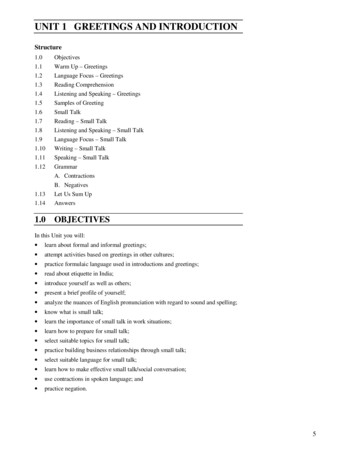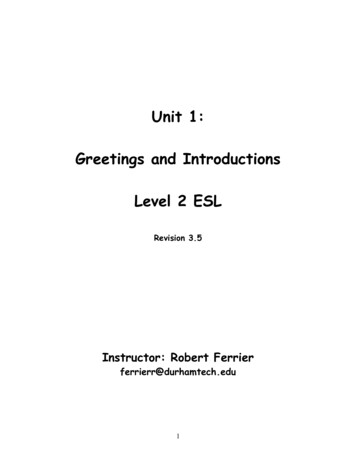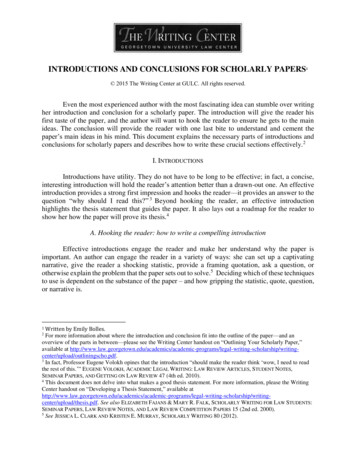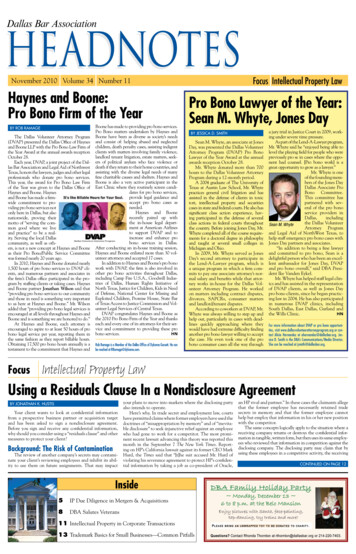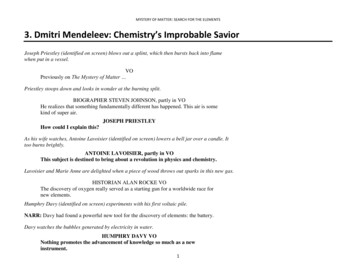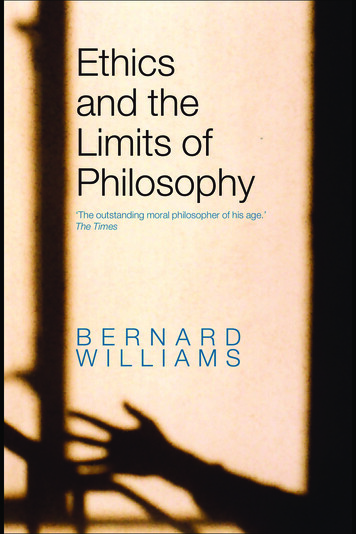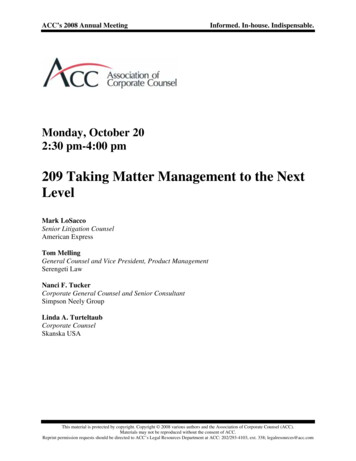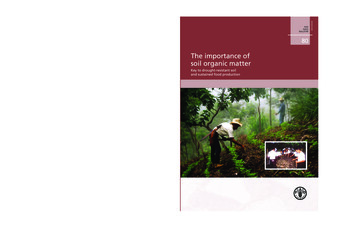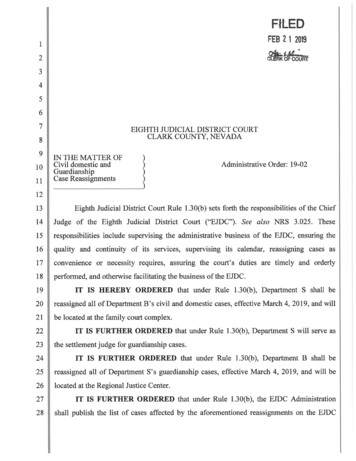
Transcription
Introductions, headnotes, and back matter copyright 2017 by LiteraryClassics of the United States, Inc., New York, N.Y.Cover photograph: American soldiers in France, 1918. Courtesy of theNational Archives.Woodrow Wilson: Copyright 1983, 1989 by Princeton University Press.Vernon E. Kniptash: Copyright 2009 by the University of Oklahoma Press.Mary Borden: Copyright Patrick Aylmer 1929, 2008.Shirley Millard: Copyright 1936 by Shirley Millard.Ernest Hemingway: Copyright 1925, 1930 by Charles Scribner’s Sons, renewed1953, 1958 by Ernest Hemingway.***The readings presented here are drawn from World War I and America:Told by the Americans Who Lived It. Published to mark the centenary ofthe American entry into the conflict, World War I and America bringstogether 128 diverse texts—speeches, messages, letters, diaries, poems,songs, newspaper and magazine articles, excerpts from memoirs andjournalistic narratives—written by scores of American participants andobservers that illuminate and vivify events from the outbreak of war in 1914through the Armistice, the Paris Peace Conference, and the League ofNations debate. The writers collected in the volume—soldiers, airmen,nurses, diplomats, statesmen, political activists, journalists—provide uniqueinsight into how Americans perceived the war and how the conflicttransformed American life. It is being published by The Library of America,a nonprofit institution dedicated to preserving America’s best and mostsignificant writing in handsome, enduring volumes, featuring authoritativetexts. You can learn more about World War I and America, and aboutThe Library of America, at www.loa.org.For materials to support your use of this reader, and for multimediacontent related to World War I, visit:www.WWIAmerica.orgWorld War I and America is made possible by the generous support of theNational Endowment for the Humanities.The Library of America14 East 60th StreetNew York, NY 10022www.loa.org
ContentsPreface . . . . . . . . . . . . . . . . . . . . . . . . . . . . . . . . . . . . . . . . . . .1I. WHY FIGHT? / Introduction by Michael S. Neiberg . . . .Alan Seeger, from a letter to Elsie Simmons Seeger,October 25, 1915 . . . . . . . . . . . . . . . . . . . . . . . . . . . . . .Woodrow Wilson, from Address to Congress on Warwith Germany, April 2, 1917 . . . . . . . . . . . . . . . . . . . . .Socialist Party of the United States, from the MajorityReport of the St. Louis Convention, April 11, 1917 . . . .35812II. THE EXPERIENCE OF WAR / Introduction by Edward G.Lengel . . . . . . . . . . . . . . . . . . . . . . . . . . . . . . . . . . . . . .15James Norman Hall: Damaged Trenches (1916) . . . . . . . .17Alan Seeger: I Have a Rendezvous with Death (1916) . . .21Robert Frost: Not to Keep (1917) . . . . . . . . . . . . . . . . . .23Ashby Williams, from Experiences in the Great War(1919) . . . . . . . . . . . . . . . . . . . . . . . . . . . . . . . . . . . . . . 24Horace Pippin: from “Autobiography, First World War”(c. 1920s) . . . . . . . . . . . . . . . . . . . . . . . . . . . . . . . . . . . 27Vernon E. Kniptash: Diary, March 30–April 1, 1919 . . . . 30III. RACE AND WORLD WAR I / Introduction by ChadWilliams . . . . . . . . . . . . . . . . . . . . . . . . . . . . . . . . . . . . .W.E.B. Du Bois, “Close Ranks,” The Crisis, July 1918 . . .W.E.B. Du Bois, “Returning Soldiers,”The Crisis, May 1919 . . . . . . . . . . . . . . . . . . . . . . . . . . .Charles R. Isum to W.E.B. Du Bois, May 17, 1919 . . . . . .IV. AMERICAN WOMEN AT WAR / Introduction by JenniferKeene . . . . . . . . . . . . . . . . . . . . . . . . . . . . . . . . . . . . . . . .Mary Borden, “Conspiracy” and “The Beach,” from TheForbidden Zone (1929) . . . . . . . . . . . . . . . . . . . . . . . . .Shirley Millard, Diary and Recollections, May 13–16,1918, from I Saw Them Die (1936) . . . . . . . . . . . . . . . .Willa Cather, from “Roll Call on the Prairies,”July 1919 . . . . . . . . . . . . . . . . . . . . . . . . . . . . . . . . . . .32353639D.44475457
ivcont entsV. THE HOME FRONT: SELLING UNITY, SUPPRESSINGDISSENT / Introduction by Chad Williams . . . . . . . . . 60George Creel, from How We Advertised America(1920) . . . . . . . . . . . . . . . . . . . . . . . . . . . . . . . . . . . . . 63Oliver Wendell Holmes, from Dissent in Abrams v. UnitedStates (1919) . . . . . . . . . . . . . . . . . . . . . . . . . . . . . . . . . 66VI. AMERICA ON THE WORLD STAGE / Introduction byMichael S. Neiberg . . . . . . . . . . . . . . . . . . . . . . . . . . . . 68Woodrow Wilson, from Address to the Senate on theLeague of Nations, July 10, 1919 . . . . . . . . . . . . . . . . .71Henry Cabot Lodge, from Speech in the Senate onthe League of Nations, August 12, 1919 . . . . . . . . . . . . 74VII. AT HOME/COMING HOME: THE TOLL OF WAR /Introduction by Jennifer D. Keene . . . . . . . . . . . . . . . .Warren G. Harding: Address at the Burial of anUnknown American Soldier, November 11, 1921 . . . . .Ernest Hemingway, “Soldier’s Home,” fromIn Our Time (1925) . . . . . . . . . . . . . . . . . . . . . . . . . . .86Questions for Discussion and Suggestions forFurther Reading . . . . . . . . . . . . . . . . . . . . . . . . . . . . . . . .Chronology . . . . . . . . . . . . . . . . . . . . . . . . . . . . . . . . . . . . . .Biographical Notes . . . . . . . . . . . . . . . . . . . . . . . . . . . . . . . . .94991137881
PrefaceMANY AMERICANS do not appreciate the key role theUnited States played in deciding the outcome of WorldWar I, the deep impact the war had on Americans who livedthrough it, or the profound ways in which it continues to resonate today. While the U.S. was a belligerent for only nineteenof the war’s fifty-two months, and suffered a fraction of thelosses of the other major combatants, in the climactic campaigns of the war Americans fought with ferocious intensity. Inthe five and a half months the American Expeditionary Forceswere engaged in major fighting, the U.S. lost more than50,000 men killed in action, a combat toll greater than that ofthe entire Vietnam War. Equally important, the war ushered inpowerful and complex changes in American culture and society. The war helped women to finally win the vote and usheredin the permissive Jazz Age, but also led to Prohibition and aheightened fear of immigrants. Amid deadly racial violenceand frustrated hopes for full citizenship for African Americans,it gave rise to the militant “New Negro” and began the GreatMigration to the North. It made the United States the mostpowerful actor on the global stage, and brought about a dramatic debate over America’s role in the world. And it calledinto question the traditional meanings of glory, honor, courage, causing many to believe, as Ernest Hemingway wrote,“There were many words that you could not stand to hear andfinally only the names of places had dignity.”This Reader presents twenty-two selections by American participants in the conflict, written from 1915 to 1929. They aredrawn from the Library of America volume World War I andAmerica: Told by the Americans Who Lived It, and give a firsthand look at the war from different points of view. Understanding how Americans perceived the conflict at the timeallows us to encounter World War I on its own terms and todraw connections with the experiences of Americans today,both combatants and civilians. The selections focus on seven1
2Pr efacekey themes. Each theme features an introduction by a distinguished scholar, questions for discussion, and suggestions forfurther reading. The reader is intended to help facilitate an informed and rewarding conversation about the war and itsconsequences.
IntroductionI. WHY FIGHT?THE AMERICAN people’s views on the war ran the gamut in1914 from indifference to support for the Allies to a desirefor strict neutrality. A small minority expressed a desire for aGerman victory. By 1917, however, American opinion was almost entirely sympathetic to the Allies as German atrocities inBelgium, the sinking of the Lusitania, and the massacre of theArmenians made the Central Powers seem like a threat not justto British and French values, but to American ones as well.Alan Seeger represents the significant group of Americans whobelieved deeply in the Allied cause from the war’s very firstdays. They saw Belgium as an innocent victim of German aggression, and France and Britain as defenders of a democraticway of life and international order that Imperial Germany wastrying to destroy. Tens of thousands of Americans joined theAllied armies or volunteered to serve the Allies as nurses, doctors, and aid workers. They served in the cause of democracyand freedom. Many, though by no means all, of them camefrom privileged backgrounds. Very few American citizens volunteered to serve the Central Powers, a clear indication ofwhere American sympathies lay.The resumption of unrestricted submarine warfare in February 1917 and the decoded Zimmerman telegram, in which theGermans tried to enlist Mexico as an ally against the UnitedStates, made almost all Americans hostile to the German cause.Some were also motivated by the March 1917 revolution in Russia, which deposed Tsar Nicholas II in favor of a democraticallyminded centrist provisional government. Nicholas’s downfallmade the war come into greater focus as a conflict between theworld’s autocracies and its democracies. In such a contest, manyAmericans saw themselves as having no choice but to side withthe democracies. The promise, however brief it turned out tobe, of democracy triumphing in Russia also held out the hope ofsomething positive coming out of the war that might justify itsenormous toll in human life.3
4Int roduct ionNot all Americans were convinced. Socialists were dividedon the war. Some supported American entry, but only if America would dedicate its power toward creating a more equitableand just world. They saw Britain and France as imperial oppressors not worthy of American assistance. Few socialists,however, saw in a German victory any hope for progress forEurope or the world. The authors of the Majority Report ofApril 1917 saw the war as a naked competition for power andprofits among the world’s capitalists. Such a war, they believed,did not deserve the support of workers anywhere, nor could itadvance the cause of democracy. They were a small percentageof Americans, but their critical view of the conflict would proveinfluential both during and after the war.President Woodrow Wilson laid out a justification for American entry in his address to Congress on April 2, 1917 askingfor a declaration of war. Wilson believed deeply that wars werethe products of avaricious and corrupt regimes, not the resultof the will of people who had to fight them. From this corebelief, Wilson concluded that America’s enemy was not theGerman people, but Kaiser Wilhelm and his militaristic government. Replacing that government with a democratic andopen one would give the German people the chance to determine their own, peaceful, future alongside their neighbors.Wilson also believed that economic exchange and open markets would give nations more incentive to cooperate with oneanother than to compete.By entering the war, Wilson believed that the United Statescould reshape the world, making it more economically open,more democratic and less imperialist. With shared democraticvalues as a basis for the new world order, he hoped, therewould be no reason for a second world war. Americans thuswent to war led by a president determined both to protect hisnation’s freedom from the growing German threat, as represented by the Zimmermann Telegram and the resumption ofunrestricted submarine warfare, and to bring about the reformation of the world.Michael S. NeibergProfessor of History,United States Army War College
SECOND B A TT L E OF C H A M PA G NE :F R A NCE , SE P TE M BE R – OCTO BE R 1 9 15Alan Seeger: from a letterto Elsie Simmons SeegerAlan Seeger graduated from Harvard College in the remarkable classof 1910 that also produced T. S. Eliot, John Reed, and Walter Lipp mann; and his life beyond Harvard Yard quickly became as artisticand bohemian and politically engaged as any of theirs. Trying hishand at poetry, he lived in Greenwich Village for the next two yearsand in Paris for two years after that. He enlisted in the French ForeignLegion in August 1914, along with fifty other Americans. By the fallhe was serving in the trenches, and on December 8, he wrote to theNew York Sun: “for the poor common soldier it is anything but romantic. His rôle is simply to dig himself a hole in the ground and tokeep hidden in it as tightly as possible. Continually under the fire ofthe opposing batteries, he is yet never allowed to get a glimpse of theenemy. Exposed to all the dangers of war, but with none of its enthusiasms or splendid élan, he is condemned to sit like an animal in itsburrow and hear the shells whistle over his head and take their littledaily toll from his comrades.” His first major battle experience camewith the French offensive in Champagne, which began on September25, 1915. Afterward he wrote to his mother.And now we are back in the far rear again, the battle is over,and in the peace of our little village we can sum up the resultsof the big offensive in which we took part. No one denies thatthey are disappointing. For we know, who heard and cheeredthe order of Joffre to the army before the battle, that it was notmerely a fight for a position, but a supreme effort to pierce theGerman line and liberate the invaded country; we know theimmense preparation for the attack, what confidence our officers had in its success, and what enthusiasm ourselves. True,we broke their first line along a wide front, advanced on anaverage of three or four kilometers, took numerous prisonersand cannon. It was a satisfaction at last to get out of thetrenches, to meet the enemy face to face, and to see German5
6A la n Seegerarrogance turned into suppliance. We knew many splendidmoments, worth having endured many trials for. But in ourlarger aim, of piercing their line, of breaking the long deadlock, of entering Vouziers in triumph, of course we failed.This check, in conjunction with the serious turn that affairshave taken in the Balkans, makes the present hour a rathergrave one for us. Yet it cannot be said to be worse than certainmoments that arrived even much later in the course of ourCivil War, when things looked just as critical for the North,though in the end of a similar guerre d’usure they pulled outvictorious.But perhaps you will understand me when I say that thematter of being on the winning side has never weighed withme in comparison with that of being on the side where mysympathies lie. This affair only deepened my admiration for,my loyalty to, the French. If we did not entirely succeed, it wasnot the fault of the French soldier. He is a better man, man forman, than the German. Any one who had seen the charge ofthe Marsouins at Souain would acknowledge it. Never wasanything more magnificent. I remember a captain, badlywounded in the leg, as he passed us, borne back on a litter byfour German prisoners. He asked us what regiment we were,and when we told him, he cried “Vive la Légion,” and keptrepeating “Nous les avons eus. Nous les avons eus.” He wassuffering, but oblivious of his wound, was still fired with theenthusiasm of the assault and all radiant with victory. What acontrast with the German wounded, on whose faces was nothing but terror and despair. What is the stimulus in their slogansof “Gott mit uns” and “für König und Vaterland” beside thatof men really fighting in defense of their country? Whatever bethe force in international conflicts of having justice and all theprinciples of personal morality on one’s side, it at least givesthe French soldier a strength that’s like the strength of tenagainst an adversary whose weapon is only brute violence. It isinconceivable that a Frenchman, forced to yield, could behaveas I saw German prisoners behave, trembling, on their knees,for all the world like criminals at length overpowered andbrought to justice. Such men have to be driven to the assault,or intoxicated. But the Frenchman who goes up is possessedwith a passion beside which any of the other forms of experi-
WH Y F IGH T?7ence that are reckoned to make life worth while seem pale incomparison. The modern prototype of those whom historyhas handed down to the admiration of all who love liberty andheroism in its defense, it is a privilege to march at his side—somuch so that nothing the world could give could make mewish myself anywhere else than where I am.Most of the other Americans have taken advantage of thepermission to pass into a regular French regiment. There ismuch to be said for their decision, but I have remained true tothe Legion, where I am content and have good comrades. Ihave a pride particularly in the Moroccan division, whereof weare the first brigade. Those who march with the Zouaves andthe Algerian tirailleurs are sure to be where there is mosthonor. We are troupes d’attaque now, and so will assist at all thebig coups, but be spared the monotony of long periods of inactive guard in the trenches, such as we passed last winter.I am glad to hear that Thwing has joined the English. I usedto know him at Harvard. He refused to be content, no doubt,with lesser emotions while there are hours to be lived such asare being lived now by young men in Flanders and Champagne. It is all to his credit. There should really be no neutralsin a conflict like this, where there is not a people whose interests are not involved. To neutrals who have stomached whatAmerica has consented to stomach from Germany—whoseideals are so opposite to hers—who in the event of a Germanvictory would be so inevitably embroiled, the question he putto himself and so resolutely answered will become more andmore pertinent.October 25, 1915
WA S H I N G TON , D . C . , A P R I L 1 9 1 7Woodrow Wilson: fromAddress to Congress on War with GermanyWilson addressed Congress on February 26, asking for the authorityto arm American merchant ships. The House of Representatives approved the measure by a vote of 403–13 on March 1, but a Senate filibuster led by Robert “Fighting Bob” La Follette, the progressiveRepublican from Wisconsin, blocked its passage before the 64thCongress adjourned on March 4. Enraged, Wilson denounced the“little group of willful men” who had “rendered the great Government of the United States helpless and contemptible” and imposedan executive order to arm the ships; but this new policy of armedneutrality failed to stop the Germans from sinking American vessels.On March 20 the cabinet unanimously recommended asking Congress for a declaration of war; and the next day Wilson requested thata joint session convene on April 2. The last president to write his ownspeeches, he toiled over multiple drafts right up until the morning ofhis address. On the evening of April 2, Wilson arrived at the Capitolto deliver one of the most important speeches in American history,contending that a war of choice had become one of necessity. Eightwords embedded in his argument—“The world must be made safefor democracy”—have remained the cornerstone of American foreignpolicy for a century. The speech received thunderous approval, whichdepressed the President. “My message to-day was a message of deathfor our young men,” he said to one of his advisers. “How strange itseems to applaud that.” A moment later, Wilson laid his head on theCabinet table and sobbed.2 April, 1917 8.30 P.M.One of the things that has served to convince us that thePrussian autocracy was not and could never be our friend isthat from the very outset of the present war it has filled ourunsuspecting communities and even our offices of governmentwith spies and set criminal intrigues everywhere afoot againstour national unity of counsel, our peace within and without,our industries and our commerce. Indeed it is now evident8
WH Y F IGH T?9that its spies were here even before the war began; and it isunhappily not a matter of conjecture but a fact proved in ourcourts of justice that the intrigues which have more than oncecome perilously near to disturbing the peace and dislocatingthe industries of the country have been carried on at the instigation, with the support, and even under the personal direction of official agents of the Imperial Government accreditedto the Government of the United States. Even in checkingthese things and trying to extirpate them we have sought toput the most generous interpretation possible upon them because we knew that their source lay, not in any hostile feelingor purpose of the German people towards us (who were, nodoubt as ignorant of them as we ourselves were), but only inthe selfish designs of a Government that did what it pleasedand told its people nothing. But they have played their part inserving to convince us at last that that Government entertainsno real friendship for us and means to act against our peaceand security at its convenience. That it means to stir up enemies against us at our very doors the intercepted note to theGerman Minister at Mexico City is eloquent evidence.We are accepting this challenge of hostile purpose becausewe know that in such a government, following such methods,we can never have a friend; and that in the presence of its organized power, always lying in wait to accomplish we know notwhat purpose, there can be no assured security for the democratic governments of the world. We are now about to acceptgauge of battle with this natural foe to liberty and shall, ifnecessary, spend the whole force of the nation to check andnullify its pretensions and its power. We are glad, now that wesee the facts with no veil of false pretence about them, to fightthus for the ultimate peace of the world and for the liberationof its peoples, the German peoples included: for the rights ofnations great and small and the privilege of men everywhere tochoose their way of life and of obedience. The world must bemade safe for democracy. Its peace must be planted upon thetested foundations of political liberty. We have no selfish endsto serve. We desire no conquest, no dominion. We seek noindemnities for ourselves, no material compensation for thesacrifices we shall freely make. We are but one of the champions
10Woodrow Wil sonof the rights of mankind. We shall be satisfied when thoserights have been made as secure as the faith and the freedom ofnations can make them.Just because we fight without rancour and without selfishobject, seeking nothing for ourselves but what we shall wish toshare with all free peoples, we shall, I feel confident, conductour operations as belligerents without passion and ourselvesobserve with proud punctilio the principles of right and of fairplay we profess to be fighting for.It will be all the easier for us to conduct ourselves as belligerents in a high spirit of right and fairness because we actwithout animus, not in enmity towards a people or with thedesire to bring any injury or disadvantage upon them, but onlyin armed opposition to an irresponsible government which hasthrown aside all considerations of humanity and of right and isrunning amuck. We are, let me say again, the sincere friends ofthe German people, and shall desire nothing so much as theearly re-establishment of intimate relations of mutual advantage between us,—however hard it may be for them, for thetime being, to believe that this is spoken from our hearts. Wehave borne with their present government through all thesebitter months because of that friendship,—exercising a patience and forbearance which would otherwise have been impossible. We shall, happily, still have an opportunity to provethat friendship in our daily attitude and actions towards themillions of men and women of German birth and native sympathy who live amongst us and share our life, and we shall beproud to prove it towards all who are in fact loyal to theirneighbours and to the Government in the hour of test. Theyare, most of them, as true and loyal Americans as if they hadnever known any other fealty or allegiance. They will beprompt to stand with us in rebuking and restraining the fewwho may be of a different mind and purpose. If there shouldbe disloyalty, it will be dealt with with a firm hand of stern repression; but, if it lifts its head at all, it will lift it only here andthere and without countenance except from a lawless and malignant few.It is a distressing and oppressive duty, Gentlemen of the
WH Y F IGH T?11Congress, which I have performed in thus addressing you.There are, it may be, many months of fiery trial and sacrificeahead of us. It is a fearful thing to lead this great peacefulpeople into war, into the most terrible and disastrous of allwars, civilization itself seeming to be in the balance. But theright is more precious than peace, and we shall fight for thethings which we have always carried nearest our hearts,—fordemocracy, for the right of those who submit to authority tohave a voice in their own governments, for the rights and liberties of small nations, for a universal dominion of right bysuch a concert of free peoples as shall bring peace and safety toall nations and make the world itself at last free. To such a taskwe can dedicate our lives and our fortunes, everything that weare and everything that we have, with the pride of those whoknow that the day has come when America is privileged tospend her blood and her might for the principles that gave herbirth and happiness and the peace which she has treasured.God helping her, she can do no other.
O P P OS I N G C A P I T A L I ST WA R :M I SSOU R I , A P R I L 1 9 1 7Majority Report of theSt. Louis Socialist ConventionThe Socialist Party of America formed in 1901; and in the 1912 presidential election, its candidate, Eugene V. Debs, received 901,551votes—6 percent of the popular vote. Immediately following thedeclaration of war, the Socialist Party held an emergency conventionin St. Louis to consider its position. The party’s minority reportstated: “Having failed to prevent the war by our agitation, we canonly recognize it as a fact and try to force upon the government, bypressure of public opinion, a constructive program.” It called for securing peace on “democratic terms,” continued freedom of speechand the press, a national referendum on conscription, and using thewar to advance “democratic collectivism.” Morris Hillquit, CharlesEmil Ruthenberg, and Algernon Lee wrote the majority report,which flatly opposed the war; and by a subsequent vote of 22,345 to2,752, the Socialist Party thus became the largest political organization to protest American participation.The forces of capitalism which have led to the war in Europeare even more hideously transparent in the war recently provoked by the ruling class of this country.When Belgium was invaded, the government enjoined uponthe people of this country the duty of remaining neutral, thusclearly demonstrating that the “dictates of humanity,” and thefate of small nations and of democratic institutions were matters that did not concern it. But when our enormous war trafficwas seriously threatened, our government calls upon us to rallyto the “defense of democracy and civilization.”Our entrance into the European war was instigated by thepredatory capitalists in the United States who boast of theenormous profit of seven billion dollars from the manufactureand sale of munitions and war supplies and from the exportation of American food stuffs and other necessaries. They are12
WH Y F IGH T?13also deeply interested in the continuance of war and the successof the allied arms through their huge loans to the governmentsof the allied powers and through other commercial ties. It isthe same interests which strive for imperialistic domination ofthe Western Hemisphere.The war of the United States against Germany cannot bejustified even on the plea that it is a war in defense of Americanrights or American “honor.” Ruthless as the unrestricted submarine war policy of the German government was and is, it isnot an invasion of the rights of the American people, as such,but only an interference with the opportunity of certain groupsof American capitalists to coin cold profits out of the bloodand sufferings of our fellow men in the warring countries ofEurope.It is not a war against the militarist regime of the CentralPowers. Militarism can never be abolished by militarism.It is not a war to advance the cause of democracy in Europe.Democracy can never be imposed upon any country by a foreign power by force of arms.It is cant and hypocrisy to say that the war is not directedagainst the German people, but against the Imperial Government of Germany. If we send an armed force to the battlefieldsof Europe, its cannon will mow down the masses of the German people and not the Imperial German Government.Our entrance into the European conflict at this time willserve only to multiply the horrors of the war, to increase thetoll of death and destruction and to prolong the fiendishslaughter. It will bring death, suffering and destitution to thepeople of the United States and particularly to the workingclass. It will give the powers of reaction in this country, thepretext for an attempt to throttle our rights and to crush ourdemocratic institutions, and to fasten upon this country apermanent militarism.The working class of the United States has no quarrel withthe working class of Germany or of any other country. Thepeople of the United States have no quarrel with the people ofGermany or any other country. The American people did notwant and do not want this war. They have not been consultedabout the war and have had no part in declaring war. They
14Socialist partyhave been plunged into this war by the trickery and treacheryof the ruling class of the country through its representatives
For materials to support your use of this reader, and for multimedia content related to World War I, visit: www.WWIAmerica.org World War I and America is made possible by the generous support of the National Endowment for the Humanities. The Library of America 14 East 60
